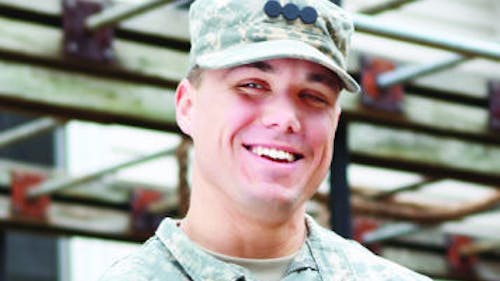ROTC member selected for prestigious award

After losing a family member on Sept. 11, Dan Aurigemma knew for certain that he wanted to serve in the military — following in the footsteps of his grandfather, father, uncle and cousins.
“I believe this is the greatest country in the world, and there’s no other country above it,” said Aurigemma, a Rutgers-Newark graduate student. “Once you see something like 9/11 happen, you realize how important it is to protect the people you know and love at home.”
Aurigemma, a selected candidate for the George C. Marshall award, said he entered the Army Reserve Officers’ Training Corps program a year ago as a young man who was immature and arrogant, still lacking confidence.
Aurigemma said a year of physical training and building leadership skills through ROTC made him see himself as a more confident individual who was put on the fast track to growing up.
The George C. Marshall award is handed out to less than five percent of all Army ROTC cadets nationwide, between 5,500 and 6,000, he said. The nomination puts Aurigemma in the top five percent.
Master Sgt. Shiloh Butterworth, a senior military instructor for the University Army ROTC, said Aurigemma does more than maintain a high GPA, work to pay the bills and dedicate 20 to 30 hours a week to being a cadet.
Aurigemma is always committed to putting his best foot forward day in and day out, he said.
“He leads through his actions and not his word,” Butterworth said of Aurigemma. “He is our Heisman trophy candidate … if you were to look up what characteristics make up a great Army leader, Dan Aurigemma has all of them.”
Butterworth said for someone to be in that position, the individual has to do well in all aspects of student life, including having a high GPA and a high Army physical fitness score.
“A score of 300 is the maximum score [that] you can get, in terms of getting a 100 percent on the Army physical fitness test,” he said. “Well, Dan has [gone] well above a 300. He’s a 350, 360 plus guy.”
The Army physical fitness test involves doing push-ups for two minutes, sit-ups for two minutes and running two miles, Butterworth said. Individuals are given points depending on the amount of repetitions done for push-ups and sit-ups and the time it takes someone to run.
He said aside from performing well in the physical fitness test, Aurigemma also excelled at Fort Lewis in Washington last summer during the Leadership Development and Assessment Course.
The program puts cadets into platoons and squads with students from around the country, Butterworth said.
“They’ll have to lead people that they’ve never met before through these missions and brief operation orders, they would have to come up with timelines and synchronized events and coordinate with other folks and make the mission happen,” he said.
Aurigemma said the University ROTC program is very strenuous because of the expected level of commitment involved.
“It’s been tough every now and then between work, school and doing all the stuff for ROTC, but thankfully that’s what being a leader in the Army [involves] — time management,” he said. “That’s what we know how to do well — manage our time and get things done.”
Before Aurigemma leaves to do an Army leadership course at Fort Benning in Georgia on July 1, he will graduate with a master’s degree in political science and concentration on international relations.
“It’s good to know exactly what you’re going to be getting into and what type of people you’ll be dealing with and cultures you’ll be dealing with — as well as what goes on [at] the international level,” he said.
He said some people could think of doing ROTC as having a guaranteed job after college. But for him, it is something bigger.
“You’re part of something that most kids our age will never ever experience,” he said. “It’s such a rewarding experience for that.”
Jason Weiner, a fellow cadet and friend of Aurigemma, said Aurigemma performs well because he has a lot more drive than other people.
“He worked all of last year — the entire year — without knowing if he had a contract [with the military],” said Weiner, a School of Arts and Science senior. “He finally found out a couple weeks before going to LDAC. So even without the contract, he worked harder than everybody.”



